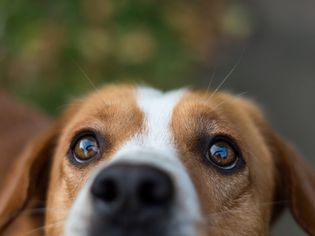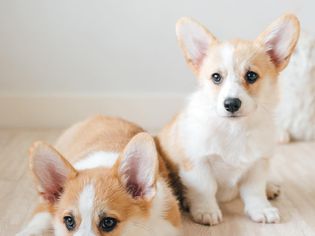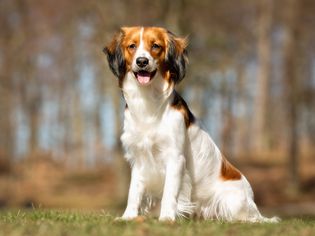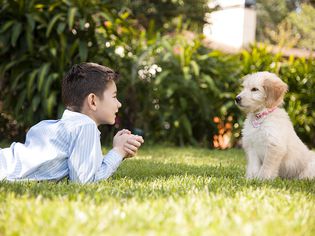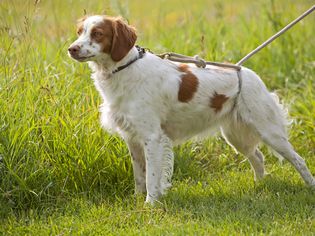The Kai Ken is a medium-sized and rare dog known for their athletic, muscular build and mix of German shepherd and wolf-like features. This well-loved and highly regarded animal, sometimes referred to as a "tiger dog" for their subtly striped coat, is an extremely intelligent dog that forms strong, close bonds with their humans and is said to go to great lengths to protect their special person.
The Kai Ken originates from Japan and was widely used as a versatile hunting dog. Their famous brindle coat acts as a natural camouflage, perfectly equipping this breed for the mountainous terrain in which they were bred to work.
Learn more about the Kai Ken, from the dog’s history to their temperament and care needs.
Breed Overview
GROUP: Working
HEIGHT: 15.5 to 19.5 inches
WEIGHT: 20 to 40 pounds
COAT: Medium length double coat
COAT COLOR: Brindle, black brindle, or red brindle (the rarest color)
LIFE SPAN: 12 to 15 years
TEMPERAMENT: Intelligent, protective, loyal, agile, alert, reserved, brave
HYPOALLERGENIC: No
ORIGIN: Japan
Characteristics of the Kai Ken
Being a loyal, amiable, and affectionate dog, the Kai Ken usually does well with respectful children and other dogs, especially if properly socialized at an early age. In addition, these are hunting dogs, so they listen well and take direction well. They’re eager to please and bond well with family. Though the breed's strong prey drive may take over around smaller pets, each individual Kai Ken will differ.
Kai Kens are athletic dogs that like to swim and climb. A tall fence in your yard can prevent them from escaping. As long as they receive enough physical activity daily, they can live in apartments. Getting plenty of exercise will also help prevent unwanted behaviors like barking, digging, and chewing.
The Kai Ken comes in three coat colors: black brindle, brindle, and red brindle. Brindle red is the rarest coat color for this breed. This dog is often mistaken for Akitas with their brindle coat.
| Affection Level | Medium |
| Friendliness | Medium |
| Kid-Friendly | High |
| Pet-Friendly | Medium |
| Exercise Needs | High |
| Playfulness | Medium |
| Energy Level | Medium |
| Trainability | High |
| Intelligence | High |
| Tendency to Bark | Medium |
| Amount of Shedding | High |
History of the Kai Ken
Originally found in the mountainous region of Japan near Mount Fuji, Kai Ken dogs got their name from the Kai province where they were found in 1929. This agile, intelligent breed is one of the six native Japanese dog breeds.
The dog quickly became a well-known hunter and was used to pursue a wide variety of prey. In 1933, Japan's government declared the Kai Ken a natural monument. In 1934, the breed was recognized by the Japanese Kennel Club.
Though the exact history of the Kai Ken dogs found in the United States is a bit murky, it is believed that they were first brought in the 1950s. However, it was not until much more recently, in the 1990s, that more Kai Kens were imported and the foundation for this still very rare breed was established.
The breed had a moment of fame when, in 2003, former First Lady Nancy Reagan found a sick and starving Kai Ken puppy on the streets of Los Angeles and saved his life, naming him Little Bear.
The Kai Ken is still not a fully recognized breed of the American Kennel Club (AKC). It is part of the AKC's Foundation Stock Service (FSS) while it awaits full recognition.
Kai Ken Care
The Kai Ken is well-suited to taking part in dog sports, agility, and any other activity that involves working alongside their human. With the proper exercise and care, the Kai Ken can be a very loyal, special dog.
Because of their active nature, these dogs need daily attention and exercise. If their needs are not met, they will find something to busy themselves and they could become destructive around the home.
Exercise
The Kai Ken is a strong, alert, and agile breed, making both mental and physical exercise important every day. A Kai Ken needs at least one hour's worth of vigorous walking a day.
Try activities where your Kai Ken has the chance to work with you instead of for you, such as agility and other team-based sports.
Examples of fun activities include:
- Flyball
- Tracking
- Hunting
- Dock diving
- Lure coursing
- Obedience training
- Hiking
- Swimming
Grooming
The famous brindle coat of the Kai Ken is of medium length and consists of two layers. This makes occasional brushing important to keep it in a healthy and shiny condition and to minimize shedding.
The Kai Ken is a relatively clean dog, so baths shouldn’t be needed very often. Twice a year, the Kai Ken will lose their undercoat, resulting in much more shedding. More frequent brushing and baths may be needed during this time.
Always be sure to keep the dog's nails trimmed, check for dirt in the ears, and brush its teeth regularly to maintain overall health.
Training
With firm loyalty and sharp intelligence, the Kai Ken is a joy to train. These dogs learn new things very quickly, enjoy working with their humans, and respond well to positive reinforcement.
Though some Kai Kens are trained to walk off-leash, be extremely cautious. Hunting is in the breed's blood, and the Kai Ken has both a strong prey drive and a tendency to fulfill their need for adventure without you if you are not paying attention.
Early socialization can help prevent aggressive tendencies that this breed can exhibit. Start training and socializing during puppyhood so they learn to be comfortable with various situations, places, and people.
Common Health Problems
The Kai Ken is generally considered healthy, but there are a few breed-specific diseases to be on the lookout for. Of course, always be on the watch for common health problems that can affect any dog too, such as obesity and ear infections.
- Luxating patella: This condition occurs when the kneecaps fall out of the groove in the leg bone, resulting in walking difficulties, especially with the hind legs.
- Hip dysplasia: This orthopedic condition is the result of abnormal development of one or both hip joints, causing limping and lameness.
- Allergies: A dog can experience many sensitivities to food and fleas, or their skin can erupt in an itchy rash.
- Seizures: A dog will experience a seizure when they have a sudden episode of abnormal brain activity.
Diet and Nutrition
To help your Kai Ken live a long, healthy life, always feed them high-quality dog food. Like any dog, it is important not to overfeed your Kai Ken. However, this breed is known for self-regulating how much they eat, so overeating is not usually a problem.
Every dog’s dietary needs are unique, so consult your veterinarian for more information about your Kai Ken’s needs.
Where to Adopt or Buy a Kai Ken
Because the Kai Ken is such a unique and prized dog, they may be difficult to find in shelters. However, it's always a good idea to make inquiries.
When looking for a Kai Ken puppy, always choose a reputable breeder to purchase from. Expect to pay a breeder between $1,500 to $2,500 for a puppy of this breed.
Listed below are some Kai Ken rescues, breeders, and helpful pages to find a shelter in your area:
- Kai Ken Society of America
- ASPCA
Kai Ken Overview
The Kai Ken is an extremely loyal, intelligent dog sure to win over the heart of any dog lover. However, these canines require a high amount of mental and physical activity, so they are best for active families. Because of their high prey drive, they may not be suitable for families with other pets.
Pros of Kai Kens
- Strong sense of loyalty
- Highly intelligent
- Does well with children
Cons of Kai Kens
- High prey drive
- Heavy shedding twice a year
- May exhibit destructive behavior if not properly exercised
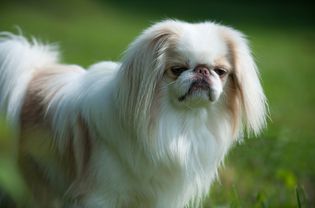
More Dog Breeds and Further Research
Kai Kens are wonderful dogs. But always be sure to do thorough research on breed-specific traits before bringing a dog into your home, and remember that every puppy is a big commitment.
If you are interested in breeds similar to the Kai Ken, take a look at the following dogs:
- Shiba Inu
- Akita
- Shar-Pei
There’s a whole world of potential dog breeds out there—with a little research, you can find the right one to bring home!
- How much does a Kai Ken dog cost?
Breeders might charge upwards of $2,500 for a Kai Ken puppy.
Why is the Kai Ken dog rare?The breed again is near extinction, even in its native land. No one really knows why even in Japan the breed is rare other than that this may be too large of a dog for many residents to keep in small homes and apartments, especially in Tokyo. But there aren't many puppies available in the U.S. either, and there are hardly any dogs that can be brought to the States from Japan for breeding. In addition, even when Kai Ken mothers have litters, they are small—about four pups—which means there's a long wait for a puppy.
Are Kai Ken dogs good for apartment living?Yes, they are great in apartments, and that's because they are more quiet dogs than barkers. The breed is highly adaptive to living in smaller spaces, as long as they are exercised outdoors each day.


